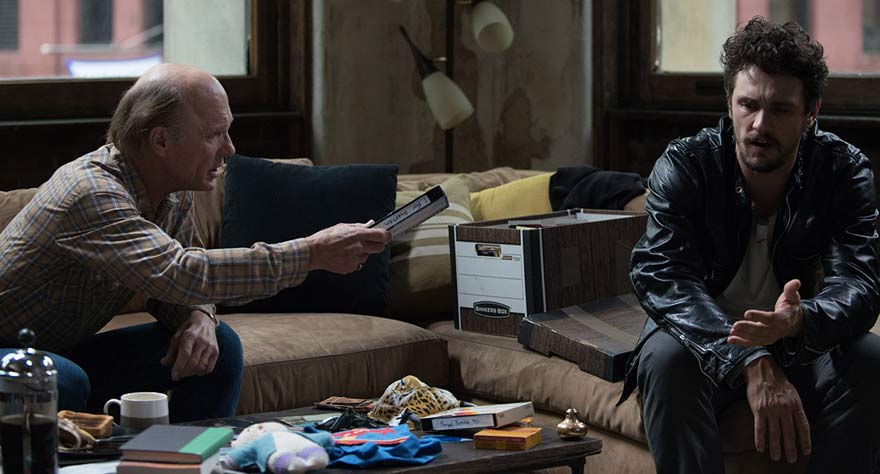
This unreliable memoir confuses despite an excellent performance from James Franco.

This unreliable memoir confuses despite an excellent performance from James Franco.
James Franco, ever the prolific actor, is easy to find on multiple screens at once fairly often. It’s especially interesting, however, to have just watched him in the memoir-adapted, true crime focused True Story when his most recent vehicle is also based on a memoir, also about a writer, and also involves a high-profile murder case. Whereas he is the suspected murderer in True Story, in Stephen Elliott’s adapted memoir The Adderall Diaries, Franco wears the writer’s shoes. The writer being Elliott, who, deep in a state of writer’s block, takes an interest in the public trial of an accused wife-murderer.
Pamela Romanowsky’s directorial debut has a few of the same old drug-fueled and frenzied elements one comes to expect in melt-down films. The cinematography of Bruce Thierry Cheung maxed out in color, angled sideways, and sometimes slowed down in a pretty, if not unexpected, way. The music of Michael Andrews fits well, pulsing when called for, though maybe not especially stirring at times.
Franco’s Elliott is propelled through life, and his writing career, by a zealous hatred and capitalization on his abusive relationship with his father. The reserves of his grudge-holding run deep. Thus far it’s proven lucrative for him, as his first auto-biographical novel is doing well and he’s gotten an advance from a publisher for his next. Except he can’t seem to write it. He sees the trial of Hans Reiser (Christian Slater) on television and, much to the dismay of his editor (Cynthia Nixon), decides to attempt an entirely different sort of novel. This will be his In Cold Blood, he claims.
At the trial he meets Lana (Amber Heard) and, with one look at his motorcycle, the two begin a relationship steeped in their mutual brokenness, hers involving an abusive step-father. It’s of course when Elliott’s life seems most together that things must coming crashing down. At a reading of his first book, wherein he’s depicted the death of his mother to cancer at an early age and the chain-reaction this had on his relationship with his father and his relationship with drugs, Elliott’s father Neil (Ed Harris) makes an appearance. Bad news is a key part of Elliott’s memoir revolves around the supposed death of his mentally abusive father. When Neil shows up, publicly decrying the lies present in Elliott’s memoir, his entire reputation and career are at stake.
The film’s source material is all about the inaccuracy of memory, the way we select and remember out of context in order to suit our feelings on our pasts. Romanowsky depicts this theme in multiple flashbacks, sometimes tweaking them to be slightly different, to add more context, as Elliott progresses. Elliott’s words also appear on the screen as he types, letting us in on his personal way of mis-remembering. Elliott as the unreliable narrator of his own life is interesting, sure, but, well, unreliable. By his own admittance. It’s hard to hope for his redemption when he doesn’t just push people away, he selfishly tries to drag them down into his dark pity party.
Franco and Harris are on point, while Slater is severely underused, his plot line of very little interest. And, I admit, there’s a certain amount of guilt one has in finding fault with a real person’s attempt to share their own difficult narrative, but somehow blaming mis-remembrance as an excuse for self-destructive behavior reeks of falsity. You can’t play the martyr if the cause never existed. Romanowsky never wins audience trust, and her film gets distracted by the lesser fleshed-out true crime story, something I’m assuming Elliott does better in his book. Added all up, The Adderall Diaries confuses itself somewhat when laying out all its many themes, and despite Franco’s masochistic charm, his protagonist remains lacking in finding his way toward empathy.